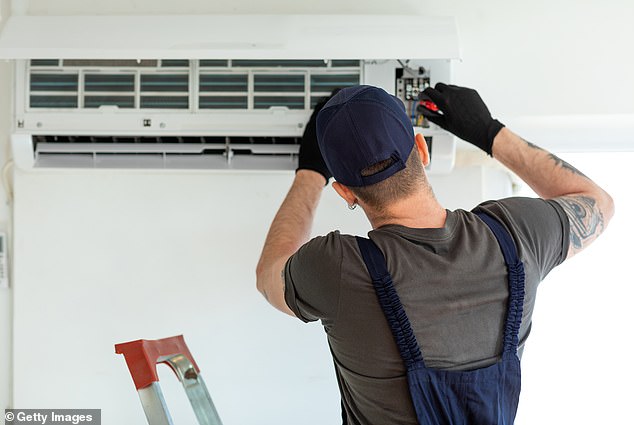Struggling to get a good night’s sleep during this sweltering summer weather?
You won’t be the first person in Britain to have thought that perhaps it is time to invest in air conditioning.
But how difficult is it, does it require major work, how much does it cost to install – and crucially is it cheap to run or will cooling room temperatures down send your electricity bills soaring?
The best way to find out the answers to these vital questions is to ask the people who really know.
We spoke to experienced air conditioning installers and professionals to tap into their knowledge – and find out what they have fitted in their own homes.
We asked our experts about their favourite units, how much you must really budget, installation and running costs, plus surprise extra benefits.
Here they provide their top tips to ensure you keep a cool head when making your decision.
Why get air conditioning?
As heatwaves become increasingly common due to climate change, attitudes towards air conditioning are changing, and now may be the time to get it fitted.

Some 55 per cent of homes are at risk of overheating, according to the UK Green Building Council, and new homes are built to keep heat in
Fewer than 5 per cent of properties in Britain have air conditioning, but this figure is set to soar to up to a third in the next couple of decades, according to the UK Energy Research Centre.
Some 55 per cent of homes are at risk of overheating, according to the UK Green Building Council, and new homes are built to keep heat in and opening windows might not be enough to stay cool.
Air conditioning can be a blessing through the summer, and some units can be used to heat rooms when it is colder.
Meanwhile, as temperatures continue to rise each year, having air conditioning in your home – even if just the bedrooms are covered – could be a major selling point if you decide to move.
Spencer Cross, 21, director and fitter for air conditioning company SJ Cooling in Bishop’s Stortford, Hertfordshire, says: ‘We expect demand to soar as people realise the cost of getting a good night’s sleep is priceless – as it affects your whole day. A decent air conditioning unit can cost as little as £500 plus fitting.’
How much does aircon cost?
There are two main costs when it comes to getting air conditioning installed, the unit itself and professional fitting.
Each room that you want air conditioning in will usually require its own unit and the ones our experts recommended cost about £500 to £650.

Spencer Cross, 21, director and fitter for air conditioning company SJ Cooling, says a good air conditioning unit can cost as little as £500
The idea of putting in an air conditioning unit yourself may sound tempting but this is electrical work and so it can be dangerous. Instead, budget from £500 to £1,000 for engineers to professionally fit each unit.
Your indoor unit will need an outdoor condensing box – the white boxes on walls many of us will recognise from holidays abroad – although as we explain below there are ways to limit these.
You can air condition your entire house but often people in Britain choose to just do their bedrooms, or the bedrooms that get very warm. At £1,500 per unit installed, fitting air conditioning to four bedrooms would cost £6,000. It should last ten to 15 years at least.
Running an air conditioner in a standard sized bedroom for eight hours will cost about £5, bigger units for larger rooms or those that get very warm will be more expensive. Often, you may find you only need to run the air conditioner for a few hours though, rather than all day or night.
Best budget choices for a good night’s sleep
The air conditioning professionals we spoke to recommend some stand-out makes and say you should ensure you get good professional advice and a comprehensive quote.
Cross says: ‘The three manufacturers I recommend are Mitsubishi, Daikin and EletcriQ. For value for money you cannot go far wrong with an ElectriQ, such as the iQool 9000 BTU model.
‘This is what I have fitted in my own home. It costs about £500 and comes with handy extras, such as a mobile app to turn the unit on from your smartphone wherever you are.
‘It can also be connected to a smart speaker, so the device can be controlled by talking to a computer such as Alexa.’
Mark Yellen, 43, director of air conditioning fitting company Green Cool UK, in Cardiff, ranks Mitsubishi at the top of his list for brands – believing that if well looked after it should work trouble-free for at least 15 years.
He says: ‘Mitsubishi units are both reliable and sleek. You live with these units inside your home, so you want it looking good. A titanium finish Mitsubishi is a far cry from a cheap white box found in hotel rooms. I recommend a Mitsubishi Heavy Industries 9,000 BTU that can cost just over £500.’
Aaron O’Reilly, owner of Belfast Cooling, in Newtownabbey, believes the value of aftercare is a vital consideration – no matter what brand you choose.
O’Reilly says: ‘I recommend LG. They offer a Dualcool Standard Plus for £650 with a ten-year warranty in case something goes wrong. It does not matter if you buy a luxury or basic unit. The value of a warranty is priceless.’
Pay a professional to fit it
Getting a reputable professional to install your air conditioning is essential.
Check the fitters are trained to a standard that qualifies them to work with ‘F gas’ – which is fluorinated gas used in air conditioning. Such qualifications are offered by bodies such as City and Guilds, Building Engineering Services Association, Logic Certification Limited Awards, and Construction Industry Training Board.
Yellen, who has been installing air conditioning units for two decades, says: ‘Give yourself a total budget of typically £1,400 to pay for a top-quality unit to be installed by a couple of professionals.
‘This includes the cost for the indoor air conditioning unit, installing power cables and piping to a compressor unit outside that turns warm air into cool air. The job for two people might take four hours.’
O’Reilly agrees that this is a realistic budget and should also include detailed instruction on how to use the air conditioning units – plus aftercare for any questions.
He adds: ‘I have been called out enough times to fix DIY jobs on air conditioning units, to know it is worth paying professionals.’
Cross says: ‘There have been cases where gases from air conditioning systems have leaked into a room and people have died. Do not take risks with your health by attempting to tackle the job yourself. It is not worth it.’
Are portable systems worth buying?
Those tempted to save money with a mobile air conditioning unit – the next step up from opening the window or having a fan in the corner – should be wary.
You can pick up units such as a Daewoo 5,000 BTU or a Logik Portable Air Conditioner for little more than £200 but our professionals don’t recommend them.
Cross says: ‘By and large, a portable air conditioner is a waste of money. It might cool a room for a year or two in the summer but then pack up. They tend to be far less efficient than professional units installed on walls.’
O’Reilly says: ‘We use portables as a temporary measure when repairing main air conditioning unit in a home. As a permanent solution they are simply a waste of money.’
Size matters with running costs
One of the most common mistakes people make is believing that the bigger and more powerful an air conditioning unit is – the better, believes Cross. He says: ‘There are a couple of calculations required when fitting air conditioning – and we recommend people call an expert to measure the room and discuss requirements rather than just buy the biggest and best they can afford.
‘If the unit is too big and powerful for a room, it will keep cutting in and out because the room chills too quickly. It uses more electricity and can shorten a unit’s lifespan.’
The first step is to calculate the BTU – the British Thermal Unit that shows how much energy is used to remove heat from your home in an hour.
A standard 9,000 BTU unit might be the right size for most rooms. However, other factors, such as the amount of sunlight through windows, room height, direction and insulation, are other considerations.
In addition to this, consider the kilowatts (kW) power produced by the air conditioner. If the unit is under 3kW it might suit a standard room, but bigger rooms often require 3kW or more.
O’Reilly says: ‘For a room that is up to 20 ft by 20 ft then 2.5kW might be enough but larger rooms may need at least 3.5kW. Otherwise, the unit might work too hard and may not provide the level of cooling you desire.’
The latest electricity tariff energy price cap set by the regulator Ofgem is 25.73p per kilowatt-hour. A 2.5kW air conditioning unit costs 64.325p an hour to run. Keep it on for eight hours in the bedroom and the total added to the electricity bill is about £5.15. A 3.5kW unit would be £7.20.
Air conditioning can also heat your home
What most people do not realise is that air conditioning units can be used all year round.
Yellen says: ‘Air conditioning need not just be about keeping cool during the brief summer months when it is too hot – but offering climate control to keep rooms feeling comfortable when the weather turns cold.’
He believes modern homes can particularly benefit from having air conditioning, as they tend to be better insulated – this keeps houses warmer in the winter but makes them susceptible to overheating in summer.
O’Reilly points out that while air conditioning units can provide temperatures as cool as 4C, they can provide heat of as high as 50C. Neither of which we’d recommend for your home.
He adds: ‘It is not just the temperature control you should consider but also the air quality. Those with allergies or who suffering from hay fever often like air conditioners.’
Spend more for sleek looks
One of the worries for many people is whether air conditioning will look ugly. You will need an outside condenser and to fit units indoors.
While you might worry about the outside box, it’s the indoor units you are likely to spend more time seeing.
You can opt for a ‘ducted’ air conditioning unit, which is more discreet and enables rooms to be cooled from grills tucked away in the ceiling that are connected to the condenser box outside. This is best suited for homes with roof space for grills and ducts for pumping in cool air.
But expect to pay handsomely for a ducted unit, at least £1,400 for the Mitsubishi FDUM, which is recommended by Cross. This compares to £500 for a standard air conditioning unit.
Fitting a whole house with ducted air conditioning may sound tempting but is not cheap – and you should typically budget at least £15,000.
A more budget-friendly solution is installing a multi-system that allows perhaps three separate air conditioning units to be connected to one single condenser box outside. Cross says this can knock £500 off the final bill compared to if you had put in three separate units.
Yellen believes the biggest return on installing for several rooms at once is the visual reward of only having one outside condenser. These boxes are typically just under 3 ft long, 2 ft wide and 1 ft deep.
He says: ‘If you install a multi-system then there is no reason why the air conditioning from three rooms cannot be channelled into one external vent. It looks a lot better.’
A cheap solution for homeowners who find the box installed on the outside of the house unsightly is to construct a slated wooden box that covers the plastic unit.
Don’t forget to get it serviced
Air conditioning units will also benefit from an annual service.
O’Reilly does not see this as a luxury but as a necessity to ensure the equipment runs at maximum efficiency and should run trouble free for years.
The service will include checking condenser and evaporator coils, motor and fans, pipework for leaks, airflow and thermostat temperatures. It includes the replacement of air filters, that if purchased separately can cost from £20.









